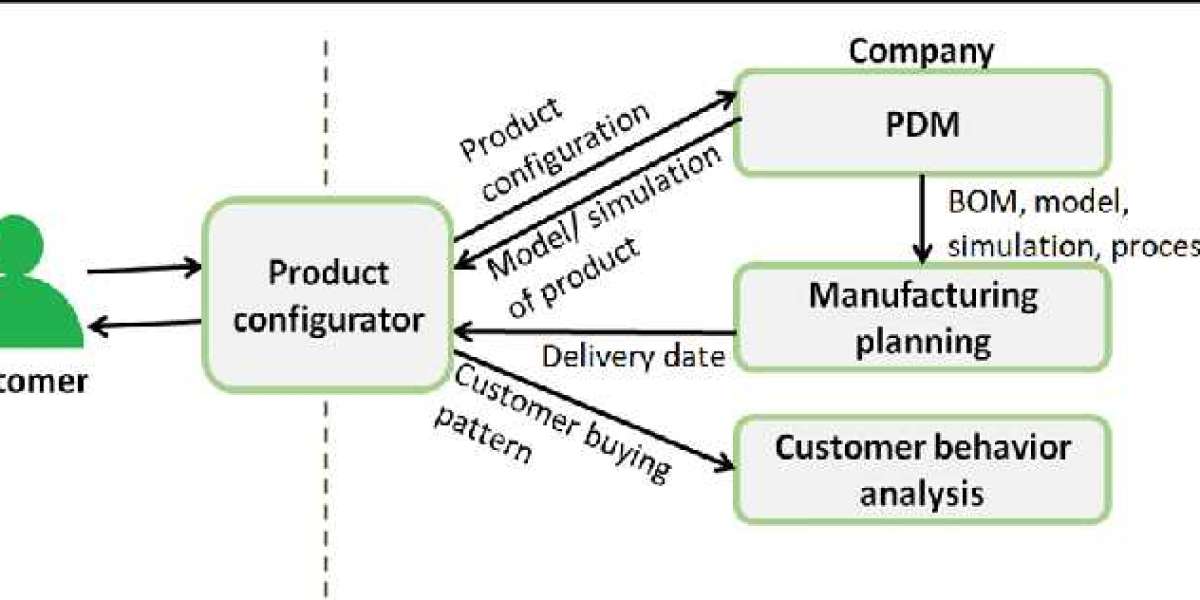Product Configurator Market: Unlocking Customization in Industry
The Product Configurator market represents a pivotal advancement in manufacturing and e-commerce, enabling businesses to offer customizable products tailored to individual customer preferences. Product configurators are software solutions that facilitate the selection, customization, and visualization of products, allowing consumers to personalize specifications such as color, size, features, and accessories. This technology is transforming industries ranging from automotive and furniture to electronics and apparel, catering to the growing demand for personalized consumer experiences.
Product Configurator Market is projected to grow from USD 2.32 Billion in 2024 to USD 5.16 billion by 2032, exhibiting a compound annual growth rate (CAGR) of 10.5% during the forecast period (2024 - 2032). This growth is driven by the increasing adoption of digital technologies, rising consumer expectations for personalized products, and the competitive advantages offered by configurable product offerings.
Request To Free Sample of This Strategic Report - https://www.marketresearchfuture.com/sample_request/22197
Key Market Segments
1. By Deployment Type
- Cloud-Based: Configurator solutions hosted on cloud platforms, offering scalability, accessibility, and integration capabilities with e-commerce platforms.
- On-Premise: Locally installed configurator software providing greater control over data and customization options, suitable for businesses with specific security or compliance requirements.
2. By End-Use Industry
- Automotive: Configurators used for customizing cars, trucks, and motorcycles, allowing customers to choose colors, interiors, and optional features.
- Furniture and Home Decor: Enabling customers to personalize furniture designs, materials, finishes, and dimensions to suit their home aesthetics.
- Electronics: Configurable options for gadgets such as laptops, smartphones, and tablets, including specifications like memory, storage, and accessories.
- Fashion and Apparel: Customization of clothing, shoes, and accessories with choices in fabric, color, size, and embellishments.
3. By Application
- Direct Sales: Manufacturers and retailers offering product configurators on their websites or in-store kiosks to enable direct customer customization and purchase.
- Dealer Networks: Configurator tools integrated into dealer networks to facilitate custom orders and streamline manufacturing processes.
- B2B Solutions: Configurator solutions tailored for business-to-business transactions, enabling customization of industrial equipment, machinery, and components.
4. By Region
- North America: Leading market for product configurators, driven by technological advancements, strong e-commerce infrastructure, and consumer demand for personalized products.
- Europe: Significant adoption in automotive, furniture, and luxury goods sectors, supported by robust manufacturing capabilities and consumer preference for bespoke products.
- Asia-Pacific: Rapidly growing market fueled by expanding middle-class population, increasing urbanization, and rising disposable incomes driving demand for customized consumer goods.
- Latin America: Emerging adoption in sectors like electronics and apparel, supported by growing digitalization and e-commerce penetration.
- Middle East and Africa: Increasing awareness and adoption of product configurators in luxury goods and automotive sectors amidst economic diversification efforts.
Industry Latest News
The Product Configurator market is dynamic, with continuous innovation and strategic developments:
- Integration with Augmented Reality (AR): Leading companies are integrating AR technology into product configurators to enable virtual product visualization, enhancing the customer experience and reducing product return rates.
- AI-Powered Recommendations: Configurator solutions leveraging artificial intelligence to analyze customer preferences and recommend personalized product configurations based on historical data and trends.
- Blockchain for Product Traceability: Adoption of blockchain technology to enhance transparency and traceability in customized product supply chains, ensuring authenticity and quality assurance.
- Expansion into New Industries: Product configurators expanding beyond traditional sectors into healthcare equipment, industrial machinery, and consumer electronics, offering customization options for complex products.
- Partnerships and Collaborations: Strategic alliances between configurator software providers, e-commerce platforms, and manufacturers to enhance configurator functionalities, improve user interfaces, and expand market reach.
Key Companies
Several prominent companies are driving innovation and market growth in the Product Configurator space:
- Configit A/S
- THREEKIT INC
- Revalize Inc,
- Resolto Informatik (Configon)
- Infosys Limited
- GoExpedi
- 3D Source
- KBMax (Epicor Software Corporation)
- Conga (Apttus)
- Sofon B.V
- io
- Cadesign form
- OmegaCube Technologies
- AES Technologies (India) Pvt. Ltd
- Mercura
- OptiProERP Software
- Prescient Technologies
- Rover Inc
- Clarity Web Solutions
- MRPeasy
- Caliburn Software Limited
Ask for Customization - https://www.marketresearchfuture.com/ask_for_customize/22197
Market Drivers
The growth of the Product Configurator market is fueled by several key drivers:
- Consumer Demand for Personalization: Increasing consumer preference for customized products tailored to individual tastes and preferences.
- Enhanced Customer Experience: Configurator tools enhance customer engagement and satisfaction by offering interactive and visual customization experiences.
- Operational Efficiency: Streamlined manufacturing processes and reduced lead times through automated quoting, ordering, and production scheduling enabled by configurator software.
- Competitive Differentiation: Businesses differentiate themselves by offering unique, customizable products, gaining a competitive edge in saturated markets.
- Advancements in Technology: Continued advancements in AI, AR, and IoT technologies enhancing the capabilities and functionalities of product configurators.
Regional Insights
Regional dynamics significantly influence the adoption and growth of Product Configurator solutions:
- North America: Leading adopter due to tech-savvy consumers, strong digital infrastructure, and high disposable incomes driving demand for personalized products.
- Europe: Robust manufacturing base and emphasis on craftsmanship contribute to widespread adoption of configurator solutions across luxury goods and automotive sectors.
- Asia-Pacific: Rapidly growing market supported by expanding e-commerce penetration, urbanization, and increasing consumer sophistication in customization preferences.
- Latin America: Emerging adoption in sectors like fashion and electronics, driven by rising middle-class population and growing online retail presence.
- Middle East and Africa: Increasing awareness and adoption in luxury and consumer goods sectors amidst economic diversification and digital transformation efforts.
Conclusion
The Product Configurator market is poised for significant growth and transformation, driven by technological advancements, consumer demand for personalized experiences, and strategic industry collaborations. As businesses across various sectors recognize the value of customization in enhancing customer engagement and operational efficiency, the adoption of product configurator solutions is expected to accelerate. Moving forward, companies that effectively leverage configurator technologies to deliver seamless, personalized customer experiences will emerge as leaders in their respective industries, shaping the future of manufacturing and retail.
Explore MRFR’s Related Ongoing Coverage In ICT Domain:
Intelligent Process Automation Market -
https://www.globenewswire.com/en/news-release/2022/10/07/2530241/0/en/Intelligent-Process-Automation-Market-is-Predicted-to-Hit-USD-29-38-Billion-at-a-CAGR-of-11-91-by-2030-Report-by-Market-Research-Future-MRFR.html
Software Engineering Market -
https://www.globenewswire.com/en/news-release/2022/10/12/2533225/0/en/Software-Engineering-Market-to-Reach-USD-123-5-Billion-With-a-11-26-CAGR-by-2030-Report-by-Market-Research-Future-MRFR.html
Public Safety LTE Market -
https://www.globenewswire.com/en/news-release/2021/10/27/2321760/0/en/Public-Safety-LTE-Market-to-Touch-USD-3-246-5-Million-at-22-07-CAGR-by-2025-Report-by-Market-Research-Future-MRFR.html
Synthetic Monitoring Market -
https://www.globenewswire.com/en/news-release/2022/11/16/2557242/0/en/Synthetic-Monitoring-Market-Is-Anticipated-To-Reach-USD-1-866-Million-at-a-CAGR-of-9-61-by-2030-Report-by-Market-Research-Future-MRFR.html







